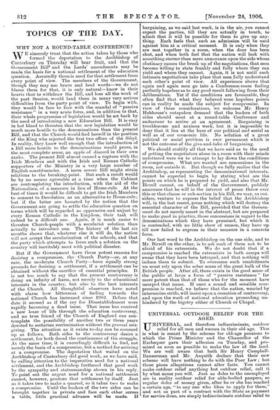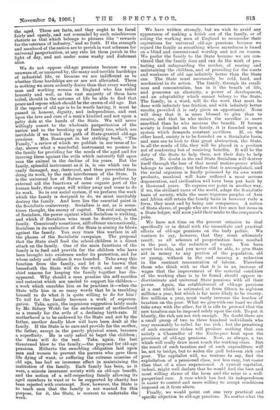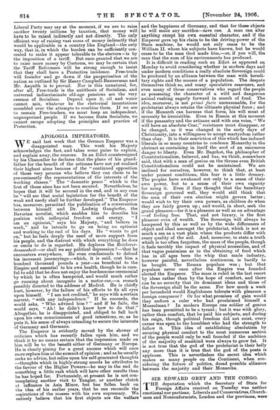UNIVERSAL OUTDOOR RELIEF FOR THE AGED.
UNIVERSAL, and therefore indiscriminate, outdoor relief for all men and women in their old age. This is what is meant by the scheme for old-age pensions to which the Prime Minister and the Chancellor of the Exchequer gave their adhesion on Tuesday, and pro- mised as soon as possible to make the law of the land. We are well aware that both Sir Henry Campbell- Bannerman and Mr. Asquith declare that their new scheme will have nothing to do with the Poor Law ; but these pious allegations cannot alter facts. You cannot make outdoor relief anything but outdoor relief, call it by what name you will. Just as doles to the unemployed are in reality outdoor relief for able-bodied paupers, so regular doles of money given, after he or she has reached a certain age, "to any one who likes to apply for them," and not as part of a contract with the State as payment for service done, are simply indiscriminate outdoor relief to the aged. These are facts, and they ought to be faced fairly and openly, and not concealed by such mischievous rhetoric as that which belongs to phrases like "rewards for the veterans of industry," and so forth. If the strength and manhood of the nation are to perish in vast schemes for universal pauperisation, at any rate let them perish in the light of day, and not under some washy and dishonest alias.
We do not oppose old-age pensions because we are unaware of, or unmoved by, the many and terrible hardships of industrial life, or because we are indifferent as to whether those hardships are or are not alleviated. There is nothing we more ardently desire than that every working man and working woman in England who has toiled honestly and well, as the vast majority of them have toiled, should in the autumn of life be able to find that peace and repose which should be the crown of old age. But if the repose of old age is to be worth having, it must be passed in honour, dignity, and independence, and rest upon the love and care of a man's kindred and not upon a petty dole at the hands of the State. We will never willingly assent to the wholesale pauperisation of the nation and to the breaking up of family ties, which are inevitable if we tread the path of State-granted old-age pensions. Mrs. Bosanquet in her striking book, "The Family," a review of which we publish in our issue of to- day, shows what a wonderful instrument we possess in the family for providing for the needs of the aged and for insuring them against the evils which naturally fall upon man the animal in the decline of his years. But the family, splendid instrument as it is, is one which can be easily damaged, nay, destroyed, and thus prevented from doing its work, by the rash interference of the State. It is the universal law of Nature that if you perform by external aid the functions of some organic part of the human body, that organ will wither away and cease to do its work. So in our social system, if we perform the work which the family is designed to do, we must inevitably destroy the family. And here lies the essential point in the Socialistic controversy. Socialism is not, as is some- times thought, the enemy of capital. The real antagonist of Socialism, the power against which Socialism is striking, and which if Socialism wins must be destroyed, is the family. Consciously sometimes, still oftener unconsciously, Socialism in its exaltation of the State is aiming its blows against the family. You may trace this warfare in all the phases of the Socialistic campaign. The proposal that the State shall feed the school-children is a direct attack on the family. One of the main functions of the family is to feed and provide for the children who have been brought into existence under its protection, and for whose safety and welfare it was founded. Take away this function from the family, and let it be known that henceforth the State will do the work, and one of the chief reasons for keeping the family together has dis- appeared. Why should a man practise the self-sacrifice and restraint which are needed to support his children— a work which ennobles him as he practises it—when the State tells him in so many words that he is troubling himself to do what it is quite willing to do for him ? To toil for the family becomes a work of superero- gation. Take, again, the ingenious suggestion lately made by Mr. Sidney Webb for the endowment of motherhood as a remedy for the evils of a declining birth-rate. If motherhood is to be endowed by the State and not by the father, another deadly blow will have been dealt at the family. If the State is to care and provide for the mother, the father, except in the purely physical sense, becomes a superfluity. He is only asked to beget the children ; the State will do the rest. Take, again, the last threatened blow to the family,—the proposal for old-age pensions. Hitherto the ennobling obligation laid upon men and women to prevent the parents who gave them life dying of want, or suffering the extreme miseries of old .age, has bad an immense effect in maintaining the institution of the family.. Each family has been, as it were, a minute insurance society with an old-age benefit, and the notion of a self-respecting family allowing its aged members to want or to be supported by charity has been rejected with contempt. Now, however, the State is to teach men that the family is not wanted for this purpose, for it, the State, is content to undertake the work. We have written strongly, but we wish to avoid any appearance of making a fetish out of the family, or of asking the working men of England to reconsider their aspirations for universal old-age pensions because we regard the family as something whose sacredness is based on a blind and conventional worship and not on reason. We prefer the family to the State because we are con- vinced that the family does and can do the work of pro- tecting and safeguarding the mother, of rearing and maintaining the children, and of providing for the wants and weakness of old age infinitely better than the State can. The State must necessarily be cold, hard, and mechanical in its action. The family, through its small- ness and concentration, has in it the breath of life, and possesses an elasticity, a power of development, and an adaptability which cannot belong to the State. The family, in a word, will do the work that must be done with infinitely less friction, and with infinitely better results, provided it is only given an opportunity. None will deny that it is more blessed to give than to receive, and that he who makes the sacrifice is more ennobled than he who receives the benefit. If human society is founded on the family, it is founded upon a system which demands constant sacrifices. If, on the other hand, society is to be founded on a Socialistic basis, and men are to look to that great abstraction, the State, in all the needs of life, they will be placed in a position not of conferring but of receiving benefits. It will be the duty of the State to help them, not their duty to help others. No doubt in the end State Socialism will destroy itself through the loss of that moral motive-power which belongs to sacrifice ; but before that is accomplished, and the social organism is finally poisoned by its own waste products, mankind will have suffered a most serious degeneration, and civilisation will have been put back by a thousand years. To express our point in another way, if we, the civilised races of the world, adopt the Socialistic basis of society, while the more vigorous peoples of Asia and Africa still retain the family basis in however rude a form, they must end by being our conquerors. A nation of State slaves, of people who are not free men but items in a -State ledger, will soon yield their necks to the conqueror's yoke.
We have not time on the present occasion to deal specifically or in detail with the immediate and practical effects of old-age pensions on the body politic. We venture to say, however, that they must ultimately result, as all schemes of pauperisation have resulted in the past, in the reduction of wages. You have never been able, and you never will be able, to give State aid in money to any portion of the population, old or young, without in the end causing a reduction in the contract remuneration of labour. Therefore those who think with us that it is in an increase of wages that the improvement of the material condition of the working class is to be found should oppose in- discriminate and universal State pensions with all their power. Again, the establishment of old-age pensions at a cost which is estimated at from fifteen to eighteen millions a year, but which is far more likely to be twenty- five millions a year, must vastly increase the burden of taxation on the poor. What we give with one hand we shall take away with the other, for it is idle to pretend that the new taxation can be imposed solely upon the rich. To put it bluntly, the rich are not rich enough. No doubt there are a small group of two to three hundred individuals who may reasonably be called far too rich ; but the penalising of such excessive riches will produce nothing that can satisfy a Chancellor of the Exchequer bent upon the provision of old-age pensions. Now, as always, a tax which will really draw must touch the working class. But the result of such taxation and of such expenditure will be, not to bridge, but to widen the gulf between rich and poor. The capitalist will, we venture to say, find the exploitation of a pensioned class, not less easy, but easier than that of a class unpensioned. A cynical capitalist, indeed, might well declare that he would Lind the best and most willing slaves of the loom and the mine in a well- pauperised race. A race which has lost its independence is easier to control and more willing to accept conditions imposed on it from above.
Finally, we would point out one very practical and specific objection to old-age pensions. No matter what the Liberal Party may say at the moment, if we are to raise another twenty millions by taxation, that money will have to be raised indirectly and not directly. The only efficient way of raising vast sums of money indirectly that would be applicable in a country like England—the only way, that is, in which the burden can be sufficiently con- cealed to make it appear tolerable to the electors—is by the imposition of a tariff. But once granted that we are to raise more money by Customs, we may be certain that the Tariff Reformers will be strong enough to insist that they shall have a Protective incidence. Free-trade will founder and go down if the pauperisation of the nation as outlined by Sir Henry Campbell-Bannerman and Mr. Asquith is to prevail. Nor is this unnatural, for, after all, Free-trade is the antithesis of Socialism, and universal indiscriminate old-age pensions are the very essence of Socialism. Depend upon it, oil and water cannot mix, whatever be the rhetorical incantations mumbled over the attempts to combine them. If we are to remain Free-traders, we must keep an independent, unpauperised people. If we become State Socialists, we cannot escape adopting the principles and practice of Protection.
















































 Previous page
Previous page